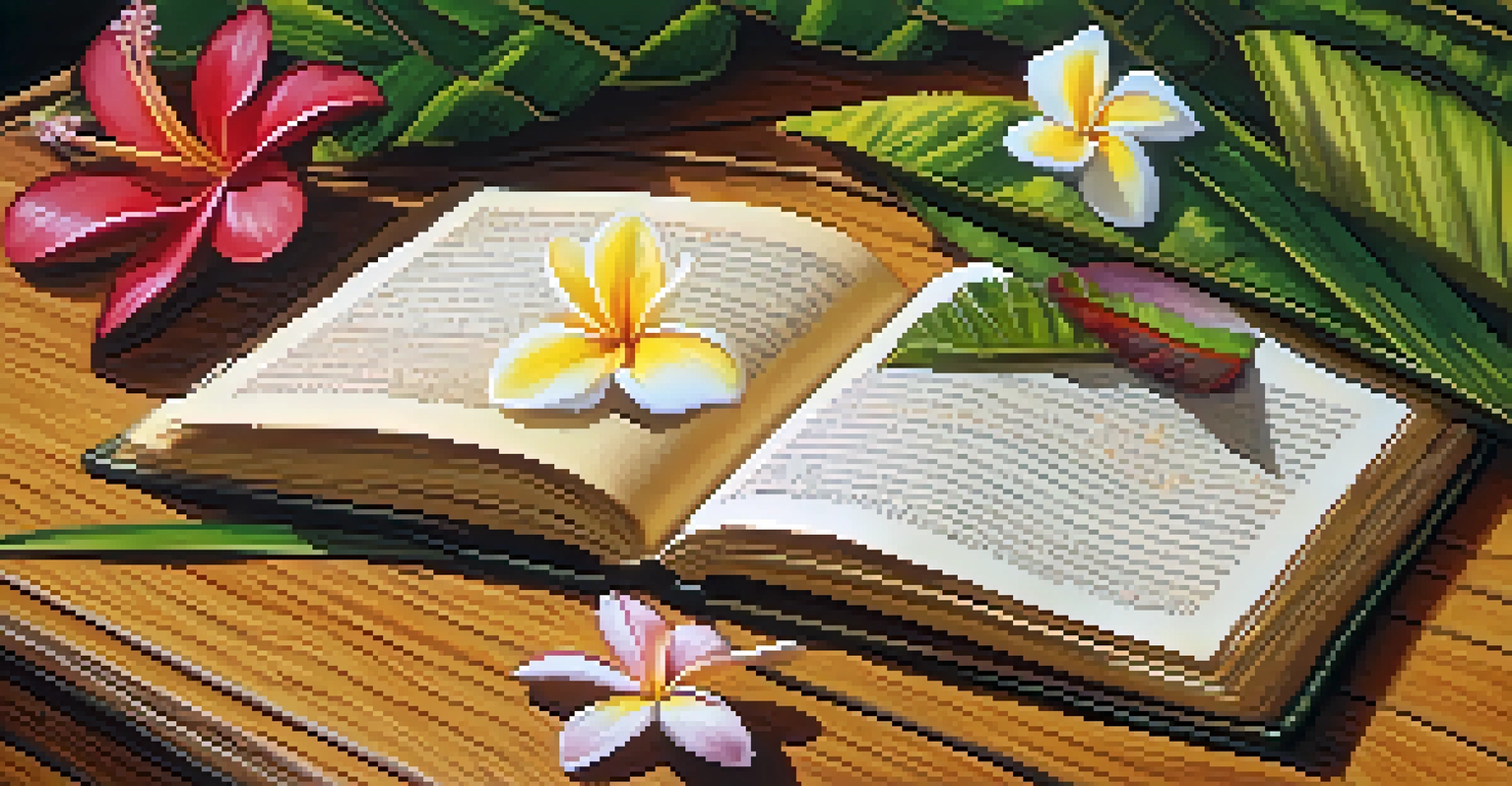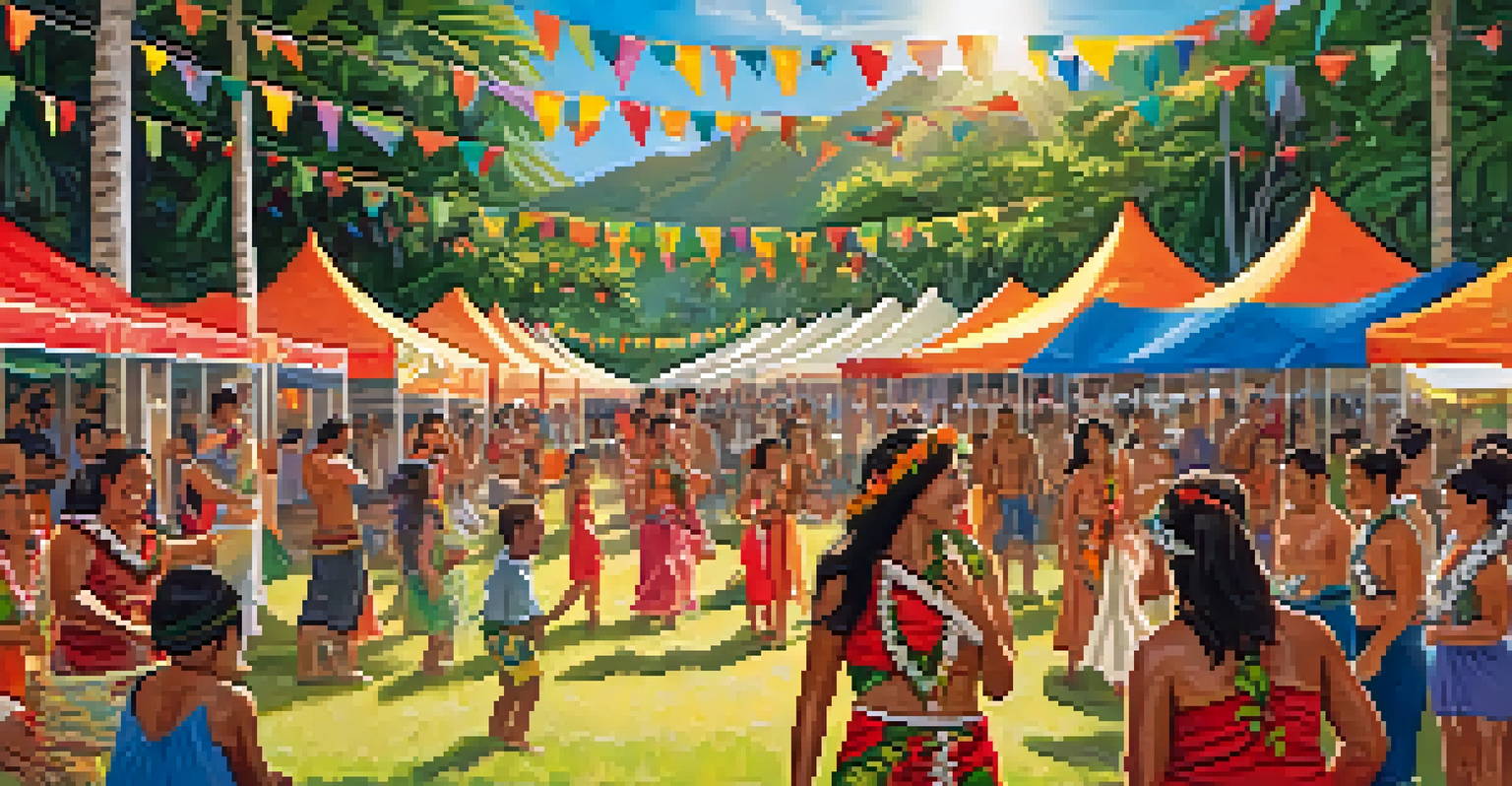Key Figures in Hawaiian Language and Literature: Their Impact

The Roots of Hawaiian Language: A Brief Overview
Hawaiian language, or 'Ōlelo Hawai'i, is an integral part of Hawaiian culture. It has ancient roots, dating back to the Polynesian settlers who arrived in Hawaii over a thousand years ago. This language reflects the history, values, and traditions of the Hawaiian people, making it more than just a means of communication.
The Hawaiian language is the soul of our culture; it carries our history, our stories, and our identity.
Despite its rich heritage, Hawaiian faced significant challenges, especially during the 19th and 20th centuries when colonization and Western influences threatened its survival. The suppression of Hawaiian language in schools led to a decline in fluent speakers. However, the resilience of the Hawaiian people sparked a revitalization movement that has breathed new life into the language.
Today, Hawaiian language is experiencing a revival, with educational programs and immersion schools fostering a new generation of speakers. This resurgence not only preserves the language but also strengthens cultural identity and pride among Hawaiians.
Queen Liliʻuokalani: A Literary Legacy
Queen Liliʻuokalani, the last reigning monarch of Hawaii, holds a special place in Hawaiian literature. Her writings, which include songs, poems, and prose, reflect her deep love for her homeland and the struggles faced by her people. Notably, her song 'Aloha ʻOe' has become an anthem of both love and loss.

Beyond her artistic contributions, Liliʻuokalani's works serve as historical documents, offering insight into the political and social issues of her time. Her experiences during the overthrow of the Hawaiian monarchy are poignantly captured in her autobiography, 'Hawaii's Story by Hawaii's Queen.' This narrative not only preserves her legacy but also educates future generations.
Revival of Hawaiian Language
The Hawaiian language is experiencing a revival through educational programs and community initiatives that foster cultural pride.
Liliʻuokalani's impact extends beyond her lifetime; her literary contributions continue to inspire Hawaiian writers and artists today. Her efforts to promote Hawaiian culture and identity resonate in contemporary movements striving for indigenous rights and recognition.
Māui: The Cultural Hero in Hawaiian Literature
Māui, the demigod and cultural hero in Hawaiian mythology, is a central figure in numerous stories and chants. He embodies the spirit of innovation and bravery, often depicted as a trickster who outsmarts gods and challenges nature. These tales not only entertain but also impart valuable lessons about resourcefulness and respect for the environment.
In the midst of struggle, we find our strength and the voice of our ancestors in the stories we tell.
Māui's adventures, such as slowing down the sun and fishing up the Hawaiian Islands, are foundational to Hawaiian storytelling. These narratives are passed down through generations, often told in both Hawaiian and English, showcasing the language's adaptability. This blend preserves the richness of Hawaiian oral traditions while making them accessible to a broader audience.
The tales of Māui continue to inspire contemporary Hawaiian literature and art, reinforcing the importance of cultural heritage. Writers and storytellers draw upon these age-old narratives to explore modern themes, ensuring that the spirit of Māui remains alive in today’s literary landscape.
Mary Kawena Pukui: Preserving Hawaiian Language
Mary Kawena Pukui was a pivotal figure in the preservation and revitalization of the Hawaiian language. As a linguist, ethnobotanist, and cultural practitioner, she dedicated her life to documenting the language and traditions of her people. Pukui’s work in compiling dictionaries and grammar guides has been instrumental in making Hawaiian language resources widely available.
Her collaboration on 'Nā Nīele o Hawaiʻi,' a comprehensive dictionary, is a testament to her commitment to language preservation. Pukui’s efforts not only supported academic pursuits but also empowered native speakers to reclaim their linguistic heritage. This work has had a lasting impact on educational institutions across Hawaii.
Queen Liliʻuokalani's Legacy
Queen Liliʻuokalani's literary contributions and historical experiences continue to inspire and promote Hawaiian culture today.
Pukui's legacy extends beyond language; she was also a storyteller and songwriter, contributing to the rich tapestry of Hawaiian literature. Her stories often reflect themes of connection to the land and the importance of community, bridging generations and fostering cultural pride.
Maui's Contemporary Writers: Shaping Modern Narratives
The modern landscape of Hawaiian literature is vibrant, with contemporary writers drawing from their cultural heritage to tell new stories. Authors like Kiana Davenport and Lois-Ann Yamanaka explore themes of identity, belonging, and the complexities of growing up in Hawaii. Their works resonate with both local and global audiences, highlighting the unique experiences of Hawaiians.
These writers often blend Hawaiian language with English, creating a dynamic literary style that reflects the duality of modern Hawaiian life. This approach not only honors traditional storytelling but also invites readers to engage with the language in an accessible way. Such narratives open a dialogue about cultural identity, colonialism, and environmental stewardship.
The contributions of contemporary Hawaiian writers enrich the literary landscape and inspire a new generation of storytellers. Their works serve as a bridge between the past and the present, ensuring that the voices of Hawaii continue to be heard and celebrated.
Hawaiian Language Revitalization: A Community Effort
The revitalization of the Hawaiian language is a collective effort that involves educators, community leaders, and passionate advocates. Programs like Pūerto Hawaiʻi and the Hawaiian Language Immersion Program are instrumental in teaching the language to young people. These initiatives foster a sense of belonging and cultural pride among students, making Hawaiian a living language.
Community events, such as language festivals and cultural workshops, further engage residents in the revitalization process. These gatherings provide opportunities for people to practice their language skills, share stories, and celebrate Hawaiian culture. By actively participating, community members reinforce the importance of preserving their linguistic heritage.
Māui's Cultural Significance
Māui, as a cultural hero in Hawaiian mythology, embodies values of innovation and respect for nature, influencing contemporary literature.
This grassroots movement not only revitalizes the language but also strengthens community bonds. As more individuals embrace 'Ōlelo Hawai'i, they contribute to a brighter future where Hawaiian culture and identity thrive.
Conclusion: The Ongoing Journey of Hawaiian Language and Literature
The journey of Hawaiian language and literature is one of resilience, creativity, and community. Key figures, from Queen Liliʻuokalani to modern writers, have played vital roles in shaping this narrative. Their contributions highlight the importance of preserving cultural identity while embracing contemporary challenges.
As the Hawaiian language continues to flourish, it serves as a beacon of hope and pride for future generations. The ongoing efforts in education, community engagement, and literary expression ensure that the stories and values of the Hawaiian people remain alive.

Ultimately, the impact of these key figures extends beyond words; they inspire a movement that honors the past while looking toward a vibrant future for Hawaiian language and literature.